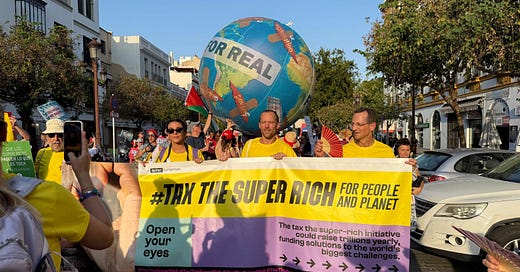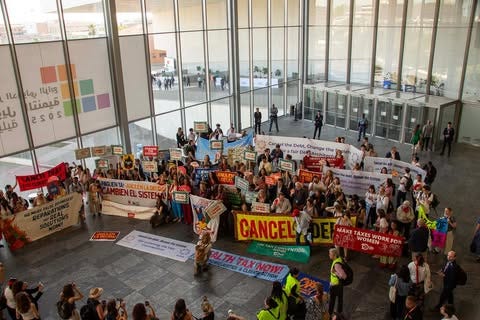It's 43 degrees in Seville the 1% have enough wealth to fund all climate goals (and then some)
A week spent campaigning to tax the super-rich in Seville in a heatwave.
TODAY! Brussels Climate Picnic
We’re hosting a climate picnic TODAY after work in Parc de Bruxelles! Bring drinks, snacks, and come join us. RSVP free here and keep an eye on our socials for updates & exact location.
Focus On… The Fight to Fund Development in Seville
It’s 43 degrees and the rich are getting richer.
I’m in Sevilla, Spain. Even the locals don’t stay here at this time of year. They go to the nearby beaches of Cadiz and Huelva to escape the ferocious heat.
Not me though. And not politicians either. The UN decided to hold a conference on funding the development goals, which include climate action and ending poverty, here, in the heart of the European heatwave.
I hope it was intentional - who wouldn’t agree to fund climate action in these temperatures? - but I’m afraid that the policymakers from countries who are most responsible for the climate crisis were shuttled from air-conditioned hotel to air-conditioned conference taxi to air-conditioned conference venue, drinking the free coffee in paper cups. Maybe not. How would I know? We rarely see them.
What I do know is that 84% of the Sustainable Development Goals are not on track. Over three billion people live in poverty, while the richest 1% have made enough wealth since 2015 to end annual poverty 22 times over.
(Full disclosure - I worked on this report with Oxfam. It’s what I do now when I’m not ranting on this newsletter. The statistics are imprinted in my brain).
By contrast, global public wealth has actually fallen. Governments have less money to pay for climate adaptation, healthcare, education, sanitation or public transport.
But it’s not that the money is not there (something I’m reminded of every day while I take the metro in Brussels, which has been ranked the second-worst in Europe despite Belgium being one of the richest countries). Rich countries have repeatedly chosen to give tax breaks to the rich and put no limits on their wealth monopoly - and in doing so, ceding political influence to them.
And god have the super-rich - who are mainly men in northern countries - taken advantage of their power. As right-wing governments cut their aid budgets and pretty much every goddamn essential piece of spending, private investors are stepping in.
Offering loans to desperately poor countries with conditions that they can’t possibly meet, to profit off their debt. Owning hospitals, roads and schools and then charging ridiculous fees for their use. In Nairobi, in a hospital chain funded by European investors, staff held a newborn captive for three months until their mother could afford 3,000 USD in hospital bills.
A few rich men want to own our right to life. But hey, Bezos has to afford to rent out Venice for his wedding somehow, right? Even if it kills us all.
But that doesn’t mean that nobody is trying. Our cynicism about corporate capture and political bureaucracy should not erase any reasons for hope. Sometimes good decisions happen in the most boring-sounding conferences in panels with the most jargon-y names.
Here’s some good things that happened at the Financing for Development conference:
Spain and Brazil launched a coalition to push for more taxes on the super-rich, supported by South Africa and Chile.
“Inequality is a problem everywhere and the richest pay less than the middle class – even less than lower-income taxpayers” - Spain’s Secretary of State for Finance, Jesús Gascón.
While hundreds met in Barcelona to protest a new airport runway expansion at El Prat Airport, eight countries, including Spain and France, proposed new taxes on private jets and luxury flights.
“What we need here is political will. We cannot keep talking about change without implementing it. The world is watching and expecting real outcomes.” - President of Kenya, William Ruto
NGOs and activists worked together to protest the shrinking space for campaigning on UN conferences. Despite heavy security restrictions (they removed our fans that read #TaxTheSuperRich even though that was one of the very things that Spain was calling for), activists pulled off a major protest inside the venue on the final day.
Of course these victories are bittersweet. A tax on private jets is not the same as a ban on private jets. Taxes on the super-rich do not eliminate the super-rich. We shouldn’t have to fight to be able to say what we want to say at these conferences. It shouldn’t be 43 degrees outside. The list of ‘shouldn’t have to’ is so long that it’s easy to spiral.
But this is where we are. And any tentative step in the right direction is insufficient and tremendous all at once, because that step is withstanding the whole weight of corporate lobbying, geopolitical tensions and growing political polarisation.
And now what? Now the conference is over, do we just sit and wait for the next conference? Hell no. We have a tendency as a climate justice movement to sit on the reactive foot, waiting for the next political moment to campaign around and subsequently be outraged about the outcome of.
This dynamic allows governments to set the timeline and the parameters of what we can ask for and what we talk about next. Do not wait to be invited to the table. Every opportunity to draw attention to inequality and holding the rich accountable.
Contact your policymakers and ask them how they’re holding the super-rich accountable. Demand transparency on party donations and what they’re doing to restrict corporate activity. Boycott companies funding genocide and avoiding taxes.
And protest. I say it every time because it’s always necessary and far better than whatever version of sitting home and doom-scrolling / spiraling about how unfair the world is / convincing yourself that it’ll all be fine is. I know we’re tired. But I promise it makes a difference to be outside, with people who feel the same.
When you’re sick, you don’t punish yourself for not running a marathon. And our political system is very sick. We start with one step, and push for the next 10, even if those ten steps take a lifetime.
Read about the campaign to #TaxTheSuperRich and share their materials online here.
What’s Going On?
Huge crowds pack Budapest to celebrate banned Pride march in Hungary.
The 1% earned enough wealth to end annual poverty 22 times over since 2015.
Kenya’s Gen Z uprising: Digital blackout meets street defiance on June 25 anniversary.
Scientists and monks perform last rites for a Himalayan glacier.
UNESCO appoints Indigenous co-chairs to protect languages and knowledge amid climate crisis.
We recently launched A Rough Idea, an extra newsletter supplement for paying subscribers on navigating your values in a capitalist society. We also have gift options and free trials available for low-income readers - just message us, we won’t ask you to prove it.
You can also support The Green Fix by tipping us a virtual coffee, or sharing our content with your networks.
So Now What Do I Do?
LEARN SOMETHING
Learn how to make a People’s Charter by people who have done it! Webinar on 18 July.
DO SOMETHING
Youth organisations can apply to join the SDSN Youth Program to collaborate on the SDGs until 15th July.
Nobel Women’s Initiative invite applications for the Sister-to-Sister Young Feminist Leadership Program by 18 July.
Federation of Young European Greens are looking for a prep team to help with their Youth Green Academy on Social Change. Apply by 20 July.
Apply for this summer school on entrepreneurship in a post-growth economy in Copenhagen. Deadline 22 July.
Stay in the loop
You can follow us on Instagram, Bluesky and LinkedIn. Connect with Cass on Instagram, Bluesky and LinkedIn.










Wealth inequality is such a huge problem. If it were just the case that the super wealthy could afford huge yachts, that would be one thing. We could just tax their wealth and purchases to pay for green tech and policies that would get us closer to net zero. It's that their wealth is power that keeps us from ever getting there!
Yes the 1% aren't just rich cos we consume their porducts. They're rich cos they avoid taxes and regulation that affect their profits. Meaning the consumer and tax payer ends up paying for the damage the cartels produced.
We're also prevented from accessing alternative products, or gaining the advantage that renewable electricity is cheaper than gas on which the price is fixed.